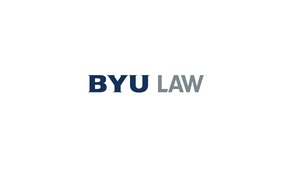
Yale Law Professor Abbe Gluck to Deliver Keynote on Ordinary Meaning and SCOTUS
PROVO, Utah, Oct. 21, 2025 /PRNewswire/ -- BYU Law today announced it will host its 10th annual Law and Corpus Linguistics Conference on October 24. The event, sponsored by Schaerr Jaffe, LLP, and the Judicial Education Institute, will convene prominent legal and linguistics scholars, judges and industry professionals interested in furthering the discipline of corpus linguistics – the method of understanding the ordinary meaning of words at the time they were written by analyzing language in large collections of texts called "corpora."
"This 10th annual conference marks a significant milestone – what began as a student law review note and a lone judicial opinion has grown into a vibrant law and corpus linguistics community," said Thomas R. Lee, BYU Law professor and retired Utah Supreme Court Justice. "Our first conference drew just a few dozen participants. Today, corpus tools are cited in judicial opinions across federal and state courts, and the field is supported by articles in top law and linguistics journals. With record-high registrations this year, we look forward to seeing this thriving community of academics, judges and practitioners continue to work together to improve how the law interprets language."
BYU Law is thrilled to host Yale Law professor Abbe Gluck as the keynote speaker for this 10th annual Law and Corpus Linguistics Conference. A prominent figure in corpus linguistics, Professor Gluck will speak on 'Ordinary Meaning and the Supreme Court: How to determine it and how faithful the Court is to it.' BYU Law Dean David Moore will present the opening remarks.
The conference agenda will also include presentations from judges and professors of both law and linguistics on works in progress. Topics include the use of corpus linguistics in constitutional interpretation, the past and future of the development of corpus tools (including the possible utility of AI tools), and the use of corpus tools in assessing the public's understanding of jury instructions.
Click here for more information about the conference, including links to the schedule, registration and details on CLE Credits for attending.
On Thursday, October 23 from 1 to 4 p.m. (MDT), BYU Law will offer a workshop for any attending linguists. This workshop will be led by law faculty and linguists and is meant to provide an introduction to the field of law as well as describe issues that those in the legal field often encounter that corpus linguistics has been or could be used to address. Graduate students and early career scholars who are interested in applying linguistics in addressing legal issues are encouraged to attend.
About BYU Law & Corpus Linguistics
In addition to hosting this annual conference, BYU Law develops pioneering legal research corpora and fosters influential scholarship and training using corpus linguistics. Its law and corpus linguistics platform and search interface (lawcorpus.byu.edu) has been used by thousands of researchers, including federal and state judges, and appellate attorneys. The platform includes the Corpus of Founding Era American English (COFEA) – a historical corpus resource for studying ordinary meaning at the time of our nation's founding, including leading up to the drafting and ratification of the U.S. Constitution. Developers' original goal was to get over a million words in the corpus, and now – just ahead of the nation's bicentennial anniversary – it has more than 138 million words. The platform, which now allows for multiple queries, enables legal professionals to analyze the meaning of words that are relevant to current cases. More than 146 legal opinions have referenced corpus linguistics since 2011, including the recent decision in United States v. Robinson (4th Cir. Feb. 13, 2024) in which corpus linguistics is used to support an interpretation of "strangulation."
About BYU Law School
Founded in 1971 with its inaugural class in 1973, the J. Reuben Clark Law School (BYU Law) has grown into one of the nation's leading law schools – recognized for innovative research and teaching in social change, transactional design, entrepreneurship, corpus linguistics, criminal justice and religious freedom. The Law School has more than 7,000 alumni serving in communities around the world. BYU Law is consistently ranked by National Jurist as one of the best-value law schools in the country. BYU Law has also been recognized as a top law school by the Bloomberg Law School Innovation Program for doing cutting-edge work with tomorrow's lawyers. As a faith-based school, BYU Law seeks to "develop people of integrity who combine faith and intellect in lifelong service to God and neighbor." For more information, visit https://law.byu.edu.
SOURCE BYU Law





Share this article